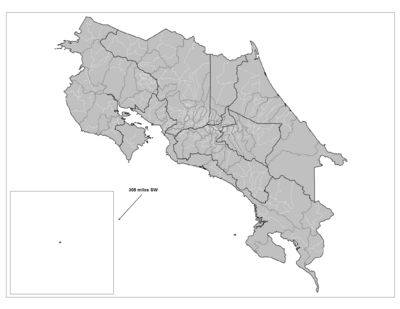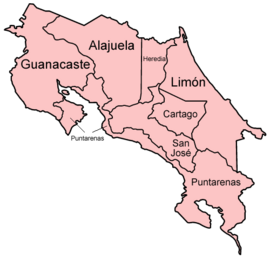Administrative divisions of Costa Rica facts for kids
Costa Rica divides its land into smaller parts for easier management. This is called "territorial division." Think of it like how your school divides into grades, and then grades divide into classes. Costa Rica's main divisions are provinces, cantons, and districts. This system helps the government manage public services across the country.
Costa Rica is currently divided into:
Each of these parts has a special number. Provinces have 1 digit. Cantons have 3 digits, starting with the province's number. Districts have 5 digits, starting with the canton's number. These district numbers are also used as postal codes for mail.
Contents
How Costa Rica's Divisions Started
When Costa Rica became a free and independent country in 1848, it created a new plan for its land. A law in December 1848 officially named the divisions as provinces, cantons, and districts.
At first, there were five provinces:
- San José, with one canton and ten districts.
- Alajuela, with two cantons and eight districts.
- Cartago, with two cantons and thirteen districts.
- Heredia, with one canton and seven districts.
- Guanacaste, with four cantons and eight districts.
Puntarenas was first called a "county," but in 1858, it became a province. Later, in 1870, the "County of Limón" was created. It became the seventh and final province in 1902.
Over the years, the number of cantons grew a lot. From 1848 to 1980, the number of cantons went from 10 to 82. The number of districts changes more often.
Provinces of Costa Rica
Costa Rica has 7 provinces. Each province has a capital city.
| Provinces of Costa Rica | ||||||
| Province | Code | Capital City | Cantons | Districts | People Living There | Area (km²) |
|---|---|---|---|---|---|---|
| San José | CR-SJ | San José | 20 | 123 | 1,404,242 | 4,965.90 |
| Alajuela | CR-A | Alajuela | 15 | 116 | 848,146 | 9,757.53 |
| Cartago | CR-C | Cartago | 8 | 51 | 490,903 | 3,124.67 |
| Heredia | CR-H | Heredia | 10 | 47 | 433,677 | 2,656.98 |
| Guanacaste | CR-G | Liberia | 11 | 61 | 326,953 | 10,140.71 |
| Puntarenas | CR-P | Puntarenas | 11 | 60 | 410,929 | 11,265.69 |
| Limón | CR-L | Limón | 6 | 30 | 386,862 | 9,188.52 |
| TOTALS | 81 | 488 | 4,301,712 | 51,100 | ||
Cantons and Local Government
Each canton has its own local government, like a City Hall or City Council. This government is in charge of local services and interests. A mayor leads the canton and is chosen by people in elections every four years. The mayor works with a Municipal Council.
The Political Constitution says that a Municipal Government manages the local interests and services in each canton. This government has a group of elected councilors and an executive officer.
Districts and Local Councils
Every canton is divided into smaller parts called districts. The number of districts can be different for each canton. Each district has a District Council led by a syndic, who is also chosen by the people.
The District Council helps connect the district with the main municipal government. They make sure the needs of the community and neighborhoods are heard by the Municipal Council. Even though the municipality manages the district directly, the District Councils also help with things like suggesting projects and checking the mayor's work.
As mentioned before, each district has a unique five-digit code. This code is used by the National Institute of Statistics and Census of Costa Rica and also serves as the postal code.
Other Ways Land is Divided
Besides provinces, cantons, and districts, there are other ways to describe places in Costa Rica:
- City (Spanish: Ciudad): This is the main urban area in a district. It's where the canton's municipal government is located. Sometimes, a city can include more than one district. For example, San José city includes all eleven districts of the San José canton.
- Province Capital (Spanish: Capital de Provincia): This is the city that is the main city of a province.
- Neighborhood (Spanish: Barrio): This is a group of homes, usually in a city. People in a neighborhood often share activities and feel like they belong together.
Indigenous Territories
Costa Rica also has 24 special areas called indigenous territories. The government has clearly marked these areas. They have some freedom to govern themselves. These territories are managed by groups called Associations of Indigenous Development. They act like local governments for their communities.
See also
 In Spanish: Organización territorial de Costa Rica para niños
In Spanish: Organización territorial de Costa Rica para niños
 | Delilah Pierce |
 | Gordon Parks |
 | Augusta Savage |
 | Charles Ethan Porter |



